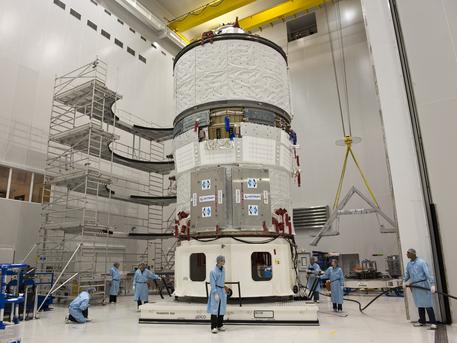ATV Johannes Kepler
Europe’s ATV space ferry ready for launch
ESA’s latest Automated Transfer Vehicle is ready for launch to the International Space Station on Tuesday, 15 February at 22:08 GMT from Europe’s Spaceport in Kourou, French Guiana. The unmanned spaceship will deliver essential supplies and reboost the Station during its mission lasting three and half months.
 © ESA/CNES/Arianespace - Photo Optique Vidéo du CSG, 2010
|
ATV Johannes Kepler during transfer from S5C to S5A, 19 November 2010, Europe’s Spaceport in Kourou.
Article Content
- » 1 - Europe’s second ATV
- » 2 - Propellant and cargo for the ISS
Europe’s second ATV
The launch will be covered live from Kourou for broadcasters and on the Web, and celebrated at a launch event in Bremen, Germany.
Johannes Kepler is the first operational ATV, following the highly successful Jules Verne qualification flight in 2008. With a total mass of over 20 tonnes, it is the heaviest payload ever launched by Europe.
ATV is a highly sophisticated spacecraft, combining an autonomous free-flying platform, a manoeuvrable space vehicle and – when docked – a space station module.
To achieve an automated docking under the very tight safety constraints imposed by human spaceflight rules, ATV carries high-precision navigation systems, highly redundant flight software and a fully autonomous collision-avoidance system with its own independent power supplies, control and thrusters.
About 10 m high with a diameter of 4.5 m, ATV includes a 45-cubic m pressurised module and a Russian docking system, similar to those used on the Soyuz manned ferries and the Progress resupply ships.
With its solar wings deployed, ATV spans 22 m. Almost three times larger than Russia’s Progress, it can also deliver about three times the cargo load.
Johannes Kepler is the first operational ATV, following the highly successful Jules Verne qualification flight in 2008. With a total mass of over 20 tonnes, it is the heaviest payload ever launched by Europe.
ATV is a highly sophisticated spacecraft, combining an autonomous free-flying platform, a manoeuvrable space vehicle and – when docked – a space station module.
To achieve an automated docking under the very tight safety constraints imposed by human spaceflight rules, ATV carries high-precision navigation systems, highly redundant flight software and a fully autonomous collision-avoidance system with its own independent power supplies, control and thrusters.
About 10 m high with a diameter of 4.5 m, ATV includes a 45-cubic m pressurised module and a Russian docking system, similar to those used on the Soyuz manned ferries and the Progress resupply ships.
With its solar wings deployed, ATV spans 22 m. Almost three times larger than Russia’s Progress, it can also deliver about three times the cargo load.
ATV Johannes Kepler
Europe’s ATV space ferry ready for launch
ESA’s latest Automated Transfer Vehicle is ready for launch to the International Space Station on Tuesday, 15 February at 22:08 GMT from Europe’s Spaceport in Kourou, French Guiana. The unmanned spaceship will deliver essential supplies and reboost the Station during its mission lasting three and half months.
 © ESA/CNES/Arianespace - Photo Optique Vidéo du CSG, 2010
|
ATV Johannes Kepler during transfer from S5C to S5A, 19 November 2010, Europe’s Spaceport in Kourou.
Article Content
- » 1 - Europe’s second ATV
- » 2 - Propellant and cargo for the ISS
Europe’s second ATV
The launch will be covered live from Kourou for broadcasters and on the Web, and celebrated at a launch event in Bremen, Germany.
Johannes Kepler is the first operational ATV, following the highly successful Jules Verne qualification flight in 2008. With a total mass of over 20 tonnes, it is the heaviest payload ever launched by Europe.
ATV is a highly sophisticated spacecraft, combining an autonomous free-flying platform, a manoeuvrable space vehicle and – when docked – a space station module.
To achieve an automated docking under the very tight safety constraints imposed by human spaceflight rules, ATV carries high-precision navigation systems, highly redundant flight software and a fully autonomous collision-avoidance system with its own independent power supplies, control and thrusters.
About 10 m high with a diameter of 4.5 m, ATV includes a 45-cubic m pressurised module and a Russian docking system, similar to those used on the Soyuz manned ferries and the Progress resupply ships.
With its solar wings deployed, ATV spans 22 m. Almost three times larger than Russia’s Progress, it can also deliver about three times the cargo load.
Johannes Kepler is the first operational ATV, following the highly successful Jules Verne qualification flight in 2008. With a total mass of over 20 tonnes, it is the heaviest payload ever launched by Europe.
ATV is a highly sophisticated spacecraft, combining an autonomous free-flying platform, a manoeuvrable space vehicle and – when docked – a space station module.
To achieve an automated docking under the very tight safety constraints imposed by human spaceflight rules, ATV carries high-precision navigation systems, highly redundant flight software and a fully autonomous collision-avoidance system with its own independent power supplies, control and thrusters.
About 10 m high with a diameter of 4.5 m, ATV includes a 45-cubic m pressurised module and a Russian docking system, similar to those used on the Soyuz manned ferries and the Progress resupply ships.
With its solar wings deployed, ATV spans 22 m. Almost three times larger than Russia’s Progress, it can also deliver about three times the cargo load.





